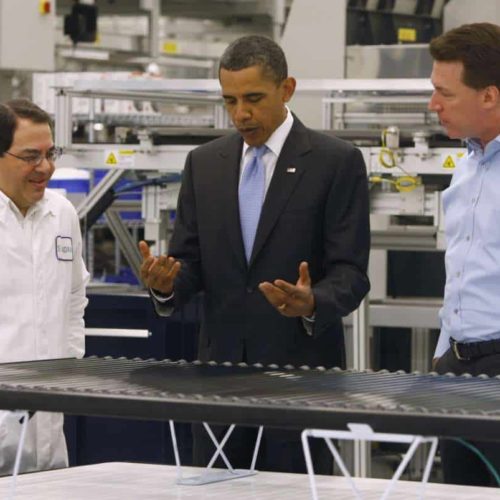Introduction
A politically-connected California producer of solar panels is again benefitting from a fast-tracked U.S. government-backed loan guarantee despite an ongoing congressional investigation and concerns about the company’s finances, iWatch News has learned.
Solyndra, based in Fremont, Calif., and backed by Obama bundler George Kaiser, is a company heralded as a prime example of the Obama administration’s efforts to create so-called “green” energy and manufacturing jobs. The solar panel manufacturer received a $535 million loan guarantee in 2009 from the Energy Department—and then, a year later, closed a plant, laid off workers and had to renegotiate terms of the loan, calling into question whether the government did due diligence before backing such a sizeable loan.
iWatch News and ABC reported in May that the Department of Energy bypassed important steps meant to protect taxpayers in awarding that loan guarantee to Solyndra.
On Friday, a House Energy and Commerce subcommittee will hold a hearing on Solyndra’s loan guarantee and the Office of Management and Budget’s role in approving it. In a document, the committee says OMB has not released internal emails they have asked for.
The company’s new loan guarantee, approved after just 41 days, comes by way of the U.S. Export-Import Bank under a new program called “Renewable Express,” meant to spur exports in that industry through a streamlined process.
In this case, the Export-Import Bank guaranteed a €7.7 million ($10.3 million) loan over 18 years that was obtained by a third-party company, Zellik II, from KBC Bank NV. That money financed a project that put Solyndra solar panels on the roof of the Delhaize supermarket chain’s distribution center, outside of Brussels.
Solyndra backer Kaiser is an Obama bundler who raised at least $50,000 for the president’s 2008 campaign. And the chairman and president of the Export-Import Bank, Fred P. Hochberg, bundled at least $100,000 for Obama.
David Miller, a Solyndra spokesman, said politics played no part in the Export-Import Bank loan guarantee. “It’s a standard financial transaction which was initiated by a European bank,” he said. “There’s no politics involved.”
Miller said Solyndra is “contemplating” additional Ex-Im deals but would not go into detail.
Phil Cogan, a spokesman for the Export-Import Bank, said in an email that the bank knew about the DOE’s large loan guarantee and the subsequent plant closing. He said that the bank’s staff “were not aware of the congressional investigation” at the time of the approval, and that Kaiser “was not involved in the loan guarantee in any way.”
Shyam Mehta, a solar industry analyst with GTM Research, said Solyndra is using new solar panel technology that hasn’t been tested over many years like more established companies’ technology.
“If you’re thinking about it from the U.S. government’s perspective, you want to be looking at other companies,” Mehta said. “Solyndra, in terms of the help it’s gotten, it’s more than enough.” He said the Ex-Im bank loan, however, is less controversial since the government is more than likely to get its money back. “From a risk-reward position, it makes sense,” he said.
Miller said it was the first time one of Solyndra’s solar panel buyers had used the export bank’s financing options for a project. It’s something the company is continuing to market to buyers to increase financing options and make Solyndra more competitive.
“All of our foreign competitors have the same ability to tap their banks for low rates,” Miller said. “This allows us to compete on a level playing field in the financing area.”
The loan guarantee was approved on Feb. 17, in just 41 days, according to the Export-Import Bank. The deal doesn’t require the level of review or time spent on site for a relatively small loan guarantee and can be fast-tracked, said Cogan, the bank’s spokesperson.
The Ex-Im Bank is pursuing goals of doubling exports by 2015 and pursuing a mantra of “government at the speed of business,” the bank’s theme at its annual meeting this year. The bank also has a Congressional mandate to steer at least 10 percent of its financing toward “environmentally beneficial” exports.
The bank is an independent federal agency that finances the sale of U.S. exports through a variety of financial options.
CORRECTION: On June 24, this story was updated to correct information about the date of the loan guarantee approval.

Join the conversation
Show Comments